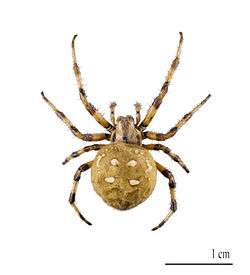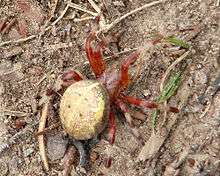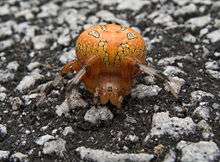Araneus
| Araneus | |
|---|---|
 | |
| European garden spider (Araneus diadematus) | |
 | |
| Four-spot orb-weaver (Araneus quadratus) | |
| Scientific classification | |
| Kingdom: | Animalia |
| Phylum: | Arthropoda |
| Class: | Arachnida |
| Order: | Araneae |
| Suborder: | Araneomorphae |
| Family: | Araneidae |
| Genus: | Araneus Clerck, 1758 |
| Type species | |
| Araneus diadematus Clerck, 1758 | |
| Species | |
|
A. alsine | |
| Diversity | |
| c. 650 species | |
Araneus is a genus of common orb-weaving spiders. It includes about 650 species, among which are the European garden spider and the barn spider.
Description

Spiders of this genus present perhaps the most obvious case of sexual dimorphism among all of the orb-weaver family, with males being normally 1⁄3 to 1⁄4 the size of females. In A. diadematus, for example, last molt females can reach the body size of up to 1 in (2.5 cm), while most males seldom grow over 0.3 in (1 cm), both excluding legspan. Males are differentiated from females by a much smaller and more elongated abdomen, longer legs, and the inability to catch or consume prey bigger than themselves.
In females, the epigyne has a long scape (a tongue-like appendage). Male pedipalps have a hook-like terminal apophysis. Abdominal tubercles are present anterolaterally.
Taxonomic history

Araneus was originally called Epeira. The latter name is now considered a junior synonym of Araneus.
It was first coined by Charles Athanase Walckenaer in 1805, for a range of spiders now considered Araneidae (orb-weavers). Over time, a rather diverse set of spiders was grouped under the genus Epeira, including species from the modern families Araneidae, Mimetidae (Mimetus syllepsicus described by Hentz, 1832), Nephilidae, Tetragnathidae, Theridiidae, Theridiosomatidae (Theridiosoma gemmosum, described by L. Koch, 1877 as Theridion gemmosum), Titanoecidae (Nurscia albomaculata, described by Lucas, 1846 as Epeira albo-maculata) and Uloboridae (Uloborus glomosus, described by Walckenaer, 1842 as Epeira glomosus).[1] Epeira cylindrica O. P-Cambridge, 1889 was at a time placed in Linyphiidae and is considered incertae sedis, as is "Araneus" cylindriformis (Roewer, 1942).
Epeira was synonymized with the genus Aranea by Leach, 1815, and with Araneus by Simon, 1904.[2]
Throughout the 19th century, Epeira was used as a catch-all genus, similar to the once ubiquitous salticid genus Attus. However, from 1911, to its last mention in 1957, only very few authors continued to use the genus in their publications, notably Franganillo (1913, 1918), Hingston (1932), Kaston (1948) and Marples (1957). Chamberlin and Ivie published a new species, Epeira miniata, in 1944, which was rejected.
Jean-Henri Fabre refers to Argiope spiders as Epeira in his 1928 book The Life of the Spider (La Vie des araignées), within the family "Epeirae". James Henry Emerton also uses the genus Epeira in his 1902 book The Common Spiders of the United States, but refers to spiders mostly now considered Araneus. The popular 1893 book American Spiders and their Spinningwork by Henry Christopher McCook also uses Epeira extensively.
The short documentary Epeira diadema (1952) by Italian director Alberto Ancilotto was nominated for an Oscar in 1953. It is about the spider today known as Araneus diadematus.
Venom
Araneus spiders possess various venoms, but will deliver a dry bite on 8 of 10 occasions. Females bite more often than males, who would rather flee or feign death.
See also
Notes
References
- Walckenaer, Charles Athanase (1805): Tableau des aranéides ou caractères essentiels des tribus, genres, familles et races que renferme le genre Aranea de Linné, avec la désignation des espèces comprises dans chacune de ces divisions. Paris.
- Bonnet, Pierre (1955): Bibliographia Araneorum. Vol. 2.
- David Edwin Hill and Herbert Walter Levi, personal communication (2008).
- Platnick, Norman I. (2009): The world spider catalog, version 9.5. American Museum of Natural History.
External links
| Wikispecies has information related to: Araneus |
| Wikimedia Commons has media related to Araneus. |
- Image of variations in A. trifolium (from Spider myths)
- Pictures of US Araneus species (free for noncommercial use)
- Pictures of A. trifolium (free for noncommercial use)